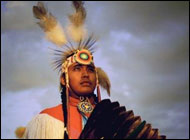American Indians Most Likely to Feel Health Care Discrimination
American Indians and Alaska Natives, especially if they identify themselves as American Indian and white, are more likely than other racial groups to feel discriminated against when receiving health care, according to a new study.
The findings come from a massive health survey of Californians completed in 2001. Nearly 9 percent of the people surveyed who were of American Indian/Alaska Native and white descent said they had felt like they were discriminated against during their past year of health care.
By comparison, just 4 percent of white and 5 percent of black Californians reported health care discrimination in the past year, according to Patrik Johansson, M.D., of the Greater Southeast Community Hospital in Washington, D.C., and colleagues.
The study appears in the October issue of Ethnicity and Disease.
The findings are troubling, particularly given the poor health of the American Indian/Alaska Native population in the United States as a whole, Johansson said.
“People who perceived discrimination in the health care setting may delay or avoid seeking care and may be less likely to follow their provider’s advice,” Johansson said.
The researchers analyzed data from the 2001 California Health Interview Survey, one of the largest telephone surveys of its kind ever conducted in the United States. The survey asked whether participants had felt discriminated against for any reason during their last year of health care and the reason for the discrimination. The survey included 2,835 adults who identified themselves as American Indian or Alaska Native. 
People who called themselves American Indian or Alaska Native and white were the most likely to say they felt discriminated against during health care, followed by those who identified themselves solely as American Indian/Alaska Native.
The American Indian/Alaska Native and white group tended to be more educated and have higher incomes than the American Indian/Alaska Native group, and were less likely to single out race as the reason for their discrimination, the researchers found.
The mixed-race group “may be more likely to more likely to be perceived as white,” making experiences more like those of the white survey participants, Johansson said. Both the white and American Indian/Alaska Native groups were most likely to say that insurance problems were to blame for their discrimination experiences.
Other studies have shown a similar link between higher socioeconomic status and feelings of discrimination in African-Americans, the researchers say.
Laura Bogart, Ph.D., a behavioral scientist at RAND Corporation who studies the link between socioeconomic status and minorities’ distrust of health care, said college-educated African-Americans, for instance, may be more likely to believe the worst about health care.
“Individuals who are more educated may be more knowledgeable about the historical problems faced by African-Americans,” in the U.S. health care system, Bogart said.
Revision date: June 14, 2011
Last revised: by David A. Scott, M.D.